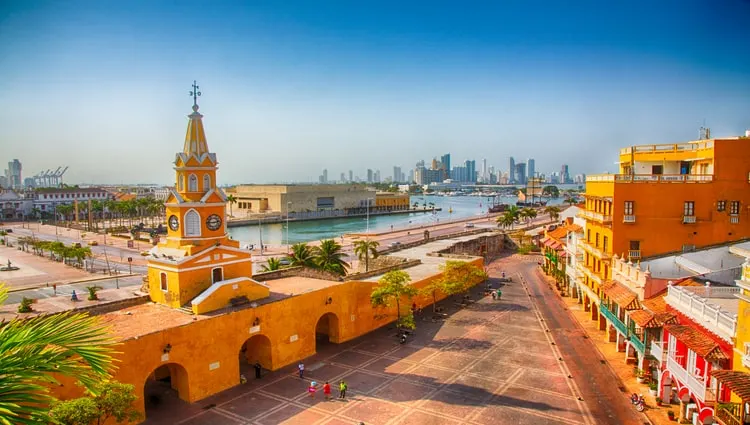Retiring abroad is an increasingly appealing choice for many, particularly those looking to stretch their savings without sacrificing quality of life. And with the Annual Global Retirement Index—you have the power to choose a country with a cost of living that suits your budget.
Below, you’ll find the most affordable expat havens we’ve found, places where your dollars will get you further than in the US: Colombia, Vietnam, Bali, Thailand, and Malaysia. We delve into what makes each of these destinations ideal for expats, from housing and healthcare to dining and transportation. Each section provides detailed insights, real-life examples, and cost breakdowns to give readers a clear picture of everyday life in these budget-friendly expat havens.
The World’s Best Retirement Havens for 2025
The World’s Best Retirement Havens for 2025
20 Countries Compared, Contrasted, Ranked, and Rated. You don’t have to be rich to enjoy a pampered retirement, you just need to know where to go. With our 34th Annual Global Retirement Index, our experts hand you a detailed roadmap. Details—and a Special Offer—Here

By submitting your email address, you will receive a free subscription to IL Postcards and special offers from International Living and our affiliates. You can unsubscribe at any time, and we encourage you to read more about our Privacy Policy.
5. Bali

By Roland Dalton
Bali is a tropical paradise that combines affordability, scenic beauty, and a warm climate, making it a highly attractive option for expats. Many retirees find that Bali’s affordability allows them to live well while exploring the surrounding Southeast Asian region.
We rent a one-bedroom villa near the beach in Seminyak for $1,325 per month, which includes utilities, internet, cable TV, and bi-weekly maid service. It’s entirely possible to find more budget-friendly options, even at half the price. For instance, small hotels and guesthouses like The Sorga, which offers a pool and breakfast, cost as little as $15 per night. Additionally, you can rent clean, comfortable accommodations for as little as $600 per month.
Healthcare in Bali is modern, high-quality, and inexpensive. Doctor consultations cost around $13, and specialist visits range from $30 to $55. Dental work, such as fillings, costs $30—significantly lower than in the U.S. For wellness-focused expats, Bali offers an array of affordable spa treatments and wellness services, with massages starting at $20.
Dining out is another area where Bali excels in affordability. Expats can enjoy meals for as little as $4 at local cafés, while a meal for two at an upscale international restaurant costs around $40. Bali’s diverse dining scene features Indonesian, Italian, Thai, and Japanese cuisine, allowing expats to enjoy a mix of flavors without overspending. We frequently dine at local warungs (traditional Indonesian cafés) that offer both authentic Indonesian dishes and wholesome Western options. At places like Warung Wayang or Warung Big Boss, we enjoy a satisfying meal for two for just $12.
Transportation on the island is both convenient and affordable. Ride-sharing apps like Grab offer easy access to transport, with a 90-minute trip costing about $11. For those who enjoy travel, flights from Bali to nearby countries, such as Singapore, start at just $110, making Bali an ideal base for regional exploration.
Bali’s vibrant expat community offers plenty of opportunities for socializing and activities, from beachfront workouts to yoga classes. Gym memberships are affordable, averaging $45 per month, and open-air gyms along the beach are free.
We spend around $2,500 a month, but this budget could be significantly reduced. It’s entirely possible to live comfortably on a pension while enjoying a quality of life that would be far out of reach in North America.
Full Cost of Living in Bali here.
4. Malaysia

By Keith Hockton
Malaysia combines modern conveniences with an affordable cost of living, making it a popular choice for expats. Compared to the U.S. and Canada, everyday expenses in Malaysia are refreshingly low, allowing for significant savings without giving up any creature comforts.
In Kuala Lumpur and Penang, a three-bedroom apartment with modern amenities rents for between $600 and $1,200 per month, providing expats with spacious accommodations at a fraction of the cost in cities like New York or Toronto. For those who prefer quieter surroundings, smaller towns offer even better deals, plus lush landscapes and a more laid-back lifestyle.
Dining out is a highlight in Malaysia, known for its multicultural food scene. Meals at hawker stalls cost as little as $2, and high-end restaurants are reasonably priced, with meals for two rarely exceeding $25. Local markets offer fresh fruits, vegetables, and seafood at low prices, while imported goods are also available for those seeking Western comforts.
Healthcare in Malaysia is highly regarded and affordable. Private hospitals offer world-class services at a fraction of U.S. prices, with routine medical visits costing between $10 and $30. An expat without insurance can expect to pay about $8,000 for a hip replacement, compared to over $60,000 in the U.S. Health insurance is also affordable, with a range of plans available to suit different budgets and needs.
Public transportation is both affordable and reliable, with buses, trains, and rideshare services available at a low cost. A one-way bus ticket costs about $0.80, and monthly passes are around $20, making it easy to explore the city without a car. For those who do want to drive, local cars are affordable, though imported vehicles come with a higher price tag. Plus, as an oil-producing country, Malaysia keeps fuel prices low, making car ownership more manageable.
Malaysia’s Malaysia My Second Home (MM2H) program offers long-term residency options for expats, making it easy to settle down and enjoy the country’s blend of comfort, culture, and affordability. With a monthly budget of $1,500 to $2,500, expats can experience a high quality of life, from exploring the country’s beautiful beaches to enjoying its vibrant urban culture. Malaysia’s welcoming atmosphere and low cost of living make it an attractive destination for retirees seeking a fulfilling, affordable lifestyle.
Full Cost of Living in Malaysia here.
3. Vietnam
By Wendy Justice

Vietnam has some of the lowest costs of living on earth, yet the lifestyle can be as comfortable as it would be living in any developed country. If you’re coming here for the first time from the U.S., the prices in Vietnam will be a shock—in a good way.
My one-bedroom furnished apartment in Hanoi’s Old Quarter costs $275 per month, including cleaning twice a week and all utilities except electricity. A similar apartment in Denver would cost at least $1,200 per month, excluding furniture, housekeeping, and most utilities. Depending on where you live in Vietnam, you may spend up to about $1,500 per month for a furnished, serviced, two-bedroom apartment, but again, a similar apartment in most U.S. cities would cost at least 70% more.
Utilities cost less in Vietnam than you would typically spend in the U.S., too. My electric bill, using air conditioning at night and during the day if needed, runs about $50 per month during the summer. In the U.S., I’d be spending nearly $200 per month for similar usage. Fiber-optic internet costs about $10 per month in Vietnam, and a monthly prepaid plan on my cell phone, which includes calls and data, costs $4.
Food and dining are also very affordable, particularly for local products. Staples like rice, coffee, and produce are inexpensive, and dining out offers incredible value. A meal at an upscale Hanoi restaurant averages $10, while street-side meals, such as pho or rice dishes, cost just $3. For a special occasion, a premium buffet with seafood, sushi, and grilled meats is around $50.
Healthcare is another area where Vietnam shines. Medical and dental care at private clinics with English-speaking staff costs about 10% of U.S. prices, and many name-brand medications cost half the price, or less, than the exact same medications in the States. If you buy generic medications, the savings are even more—figure 10% of U.S. prices. That’s likely less than most people would spend on their co-pay in the States.
Transportation options are varied and cost-effective. Ride-hailing apps provide convenient travel, with motorbike taxis costing half the rate of regular cabs. For those who prefer public transit, bus fares are about 30 cents per trip. Although Vietnam lacks a dedicated retirement visa, expats can renew three-month tourist visas with periodic trips to nearby countries, such as Thailand, for as little as $100.
I appreciate living in a place where I don’t have to even think about how much things cost. I can afford to take a trip and stay in a four or five-star hotel, knowing that it won’t put me over my budget. I can join a gym or treat myself to a massage whenever I want. Retirees can live well in Vietnam on nothing more than their Social Security income, which makes Vietnam a perfect retirement haven.
Full Cost of Living in Vietnam here.
How To Move Out of the U.S.
How To Move Out of the U.S.
The policy implications of the last election impacted your retirement funds, taxes, healthcare, and more. But you can protect yourself, your family, your future. In lots of safe, warm, friendly spots abroad, you can live comfortably on a budget from $2,000-$3,800 a month (all-in—housing and extras included). We’ll show you how—and where—to go.

By submitting your email address, you will receive a free subscription to IL Postcards and special offers from International Living and our affiliates. You can unsubscribe at any time, and we encourage you to read more about our Privacy Policy.
2. Thailand

By Bart Walters
Whether expats are drawn to the bustling energy of Bangkok, the peaceful setting of Chiang Mai, or the beaches of Phuket, Thailand provides options to suit every lifestyle and budget. Bangkok’s cosmopolitan vibe is ideal for city lovers, while Chiang Mai’s mountainous landscapes appeal to those seeking tranquility, and Phuket offers beachside living at its best.
If I compare the cost of living in my hometown of Orlando, Florida, to where I live now in Jomtien Beach, Thailand, the difference is clear: it’s half. The rent for my luxury 700-square-foot, fully furnished condo within walking distance of the beach is just under $600. A comparable place in Ft. Lauderdale (a fair comparison, in my opinion) would cost over $1,200. My spacious three-bedroom condo near the beach is on the market for 10 million THB (just under $300,000). The same unit in Florida would easily be priced at over $600,000.
Thailand’s food scene is renowned for both quality and affordability. Fresh produce, including tropical fruits and seafood, is inexpensive, and a meal at a local café costs just $4. Street food is a cultural staple, with dishes like noodles and curries costing as little as $2. For those seeking a more refined dining experience, high-end restaurants remain affordable, with dinner for two at a mid-range restaurant costing around $25.
Imagine ordering a whole sea bass big enough to feed two people with rice and drinks for less than $10. Expats in Thailand don’t just eat cheaper, they eat better. A single person can eat fresh fruits and vegetables and quality meat, poultry, and fish every day on a budget of $300 or less per month.
Healthcare in Thailand is world-class and cost-effective, attracting medical tourists from around the globe. Dental cleanings, check-ups, and even surgeries are available at a fraction of U.S. prices. Thailand’s private hospitals are internationally accredited, and many have English-speaking staff. Routine health screenings are affordable, and an annual check-up typically costs under $100. When I get my annual comprehensive old guy physical, the cost is 67% cheaper than in my hometown. When I got my right hip replaced in Thailand two years ago, it cost one-third of the left hip I had done in the US four years earlier.
Transportation in Thailand is efficient and budget-friendly. Bangkok’s BTS Skytrain and MRT subway systems make getting around the city convenient, with monthly passes costing under $50. Ride-hailing apps like Grab are also widely used, and motorbikes offer an affordable transportation option outside major cities. For regional travel, Thailand’s intercity bus and train systems are reliable and inexpensive.
But, here’s the part that’s hard to calculate. The lifestyle many expats enjoy in Thailand simply isn’t available in their home country. You can’t live as healthy and happy as we do in Thailand in most western countries for any amount of money. I live twice as good for half the money. Put that in your spreadsheet!
Full Cost of Living in Thailand here.
1. Colombia

By Erin Donaldson
Colombia consistently ranks as one of the most affordable destinations in Latin America for expats. Despite occasional political fluctuations, the country is a safe and welcoming option for retirees. While cities like Bogotá, Medellín, and Cartagena are popular, Colombia’s mid-sized cities, such as Pereira, Manizales, Bucaramanga, and Santa Marta, offer a high quality of life at a fraction of the cost. In these cities, expats can expect a monthly budget of $1,000 to $2,000 to cover comfortable living expenses.
In an upper-middle-class neighborhood (strata 4), our monthly utilities run about $75 for me, my mother, and my two children. Groceries typically cost us around $500 or less, depending on how many imported items we buy, like supplements and nuts. We get fresh, organic milk for the baby for just $3 per liter, and at the local market, $15 can buy a huge haul of fresh fruits and vegetables.
Transportation is another cost-saving factor. Most expats find that owning a car isn’t necessary, thanks to Colombia’s efficient public transit. Cities like Manizales have buses and cable cars that make getting around easy and affordable. For longer trips, hiring a private driver is common and costs between $5 and $7 per hour, while a day trip ranges from $50 to $100.
Healthcare in Colombia is high-quality and budget-friendly. Health insurance plans have low monthly premiums, typically under $50, and co-pays for doctor visits are just a few dollars. Dental work, such as root canals and crowns, costs between $300 and $500. Colombia also offers a range of wellness treatments at affordable rates, with massages priced at $20 and spa treatments available for under $75.
Dining out is one of the best perks of life in Colombia. A well-prepared "almuerzo ejecutivo" (executive lunch) with soup, a main dish, drink, and maybe a little dessert averages around $5 USD. Breakfast can be even cheaper!
If you want to indulge in a fancy meal, you can dine at top restaurants in Manizales or Pereira for $20 or less. The ingredients are often fresh, locally grown, and tailored to what’s available in the region.
My mother has been living here with me on her Social Security for almost a decade. While her Spanish isn't perfect, she wouldn’t trade her life here for anything—she feels healthier and happier in Colombia.
With its scenic landscapes, rich culture, and affordable amenities, Colombia provides expats with an exceptional quality of life. This vibrant country is ideal for those seeking community, comfort, and a lifestyle that balances adventure with affordability.
Full Cost of Living in Colombia here.
How To Move Out of the U.S.
How To Move Out of the U.S.
The policy implications of the last election impacted your retirement funds, taxes, healthcare, and more. But you can protect yourself, your family, your future. In lots of safe, warm, friendly spots abroad, you can live comfortably on a budget from $2,000-$3,800 a month (all-in—housing and extras included). We’ll show you how—and where—to go.

By submitting your email address, you will receive a free subscription to IL Postcards and special offers from International Living and our affiliates. You can unsubscribe at any time, and we encourage you to read more about our Privacy Policy.
